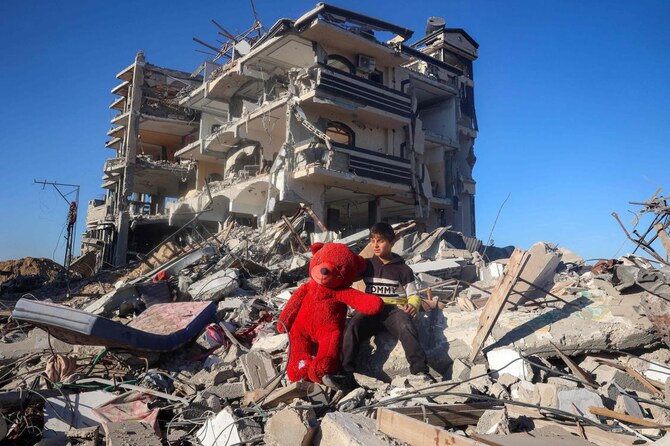RAFAH: Palestinians in Gaza are confronting an apocalyptic landscape of devastation after a ceasefire paused more than 15 months of fighting between Israel and Hamas.
Across the tiny coastal enclave, where built-up refugee camps are interspersed between cities, drone footage captured by The Associated Press shows mounds of rubble stretching as far as the eye can see — remnants of the longest and deadliest war between Israel and Hamas in their blood-ridden history.
“As you can see, it became a ghost town,” said Hussein Barakat, 38, whose home in the southern city of Rafah was flattened. “There is nothing,” he said, as he sat drinking coffee on a brown armchair perched on the rubble of his three-story home, in a surreal scene.
Critics say Israel has waged a campaign of scorched earth to destroy the fabric of life in Gaza, accusations that are being considered in two global courts, including the crime of genocide. Israel denies those charges and says its military has been fighting a complex battle in dense urban areas and that it tries to avoid causing undue harm to civilians and their infrastructure.
Military experts say the reality is complicated.
Opinion
This section contains relevant reference points, placed in (Opinion field)
“For a campaign of this duration, which is a year’s worth of fighting in a heavily urban environment where you have an adversary that is hiding in among that environment, then you would expect an extremely high level of damage,” said Matthew Savill, director of military sciences at the Royal United Services Institute, a British think-tank.
Savill said that it was difficult to draw a broad conclusion about the nature of Israel’s campaign. To do so, he said, would require each strike and operation to be assessed to determine whether they adhered to the laws of armed conflict and whether all were proportional, but he did not think the scorched earth description was accurate.
International rights groups. including Amnesty International and Human Rights Watch, view the vast destruction as part of a broader pattern of extermination and genocide directed at Palestinians in Gaza, a charge Israel denies. The groups dispute Israel’s stance that the destruction was a result of military activity.
Human Rights Watch, in a November report accusing Israel of crimes against humanity, said “the destruction is so substantial that it indicates the intention to permanently displace many people.”
From a fierce air campaign during the first weeks of the war, to a ground invasion that sent thousands of troops in on tanks, the Israeli response to a Hamas-led attack on Oct. 7, 2023, has ground down much of the civilian infrastructure of the Gaza Strip, displacing 90 percent of its population. The brilliant color of pre-war life has faded into a monotone cement gray that dominates the territory. It could take decades, if not more, to rebuild.
Airstrikes throughout the war toppled buildings and other structures said to be housing militants. But the destruction intensified with the ground forces, who fought Hamas fighters in close combat in dense areas.
If militants were seen firing from an apartment building near a troop maneuver, forces might take the entire building down to thwart the threat. Tank tracks chewed up paved roads, leaving dusty stretches of earth in their wake.
The military’s engineering corps was tasked with using bulldozers to clear routes, downing buildings seen as threats, and blowing up Hamas’ underground tunnel network.
Experts say the operations to neutralize tunnels were extremely destructive to surface infrastructure. For example, if a 1.5-kilometer (1-mile) long tunnel was blown up by Israeli forces, it would not spare homes or buildings above, said Michael Milshtein, a former Israeli army intelligence officer.
“If (the tunnel) passes under an urban area, it all gets destroyed,” he said. “There’s no other way to destroy a tunnel.”
Cemeteries, schools, hospitals and more were targeted and destroyed, he said, because Hamas was using these for military purposes. Secondary blasts from Hamas explosives inside these buildings could worsen the damage.
The way Israel has repeatedly returned to areas it said were under its control, only to have militants overrun it again, has exacerbated the destruction, Savill said.
That’s evident especially in northern Gaza, where Israel launched a new campaign in early October that almost obliterated Jabaliya, a built up, urban refugee camp. Jabaliya is home to the descendants of Palestinians who fled, or were forced to flee, during the war that led to Israel‘s creation in 1948. Milshtein said Israel’s dismantling of the tunnel network is also to blame for the destruction there.
But the destruction was not only caused from strikes on targets. Israel also carved out a buffer zone about a kilometer inside Gaza from its border with Israel, as well as within the Netzarim corridor that bisects north Gaza from the south, and along the Philadelphi Corridor, a stretch of land along Gaza’s border with Egypt. Vast swaths in these areas were leveled.
Amir Avivi, a retired Israeli general, said the buffer zones were an operational necessity meant to carve out secure plots of land for Israeli forces. He denied Israel had cleared civilian areas indiscriminately.
The destruction, like the civilian death toll in Gaza, has raised accusations that Israel committed war crimes, which it denies. The decisions the military made in choosing what to topple, and why, are an important factor in that debate.
“The second militants move into a building and start using it to fire on you, you start making a calculation about whether or not you can strike,” Savill said. Downing the building, he said, “still needs to be necessary.”





























